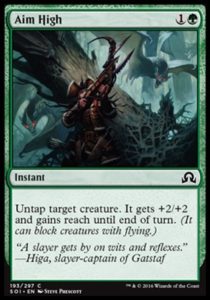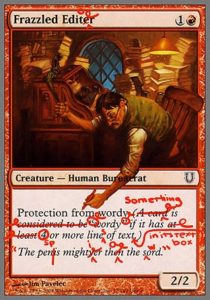The last week and a half have been a whirlwind. The Pro Tour has come and gone, LSV makes another PT Top Eight, and Bant Company fails to claim the crown another time, giving folks hope that Standard won’t fall victim to the obvious best deck. On my end, I spent last week working at Gen Con (which was amazing and exhausting, more on that later). Just before flying to Indianapolis, I attended GP Montreal, my first major tournament in over a year.
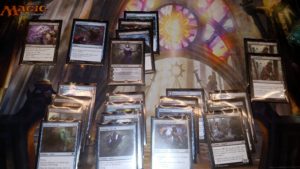 A Rough Start
A Rough Start
Since my last GP was in July 2015, I’d lost all my byes. I jumped in a grinder, opened what seemed like an insanely strong pool, then lost in round three. Fortunately, some of the most talented folks in the tournament wanted to team draft, and I had the good fortune of joining them. I went 1-5 across two team drafts, and while I certainly acknowledge that I was among my betters, it felt like I was losing due to more than just inferior play. My draft decks felt really, really strong; they both had solid curves and excellent removal, but they seemed to always wind up falling just short of killing my opponent, who would then slowly and painfully turn the game around.
I tried not to let my poor start bring me down and instead glean what I could from the experience: Shadows Over Innistrad is a faster format than Eldritch Moon. In Shadows, a solid curve and some combat tricks or removal are often all that was necessary to triumph; Eldritch Moon relies more on card advantage, where the incremental advantage of even minor two-for-ones can trump decks which were king in Shadows.
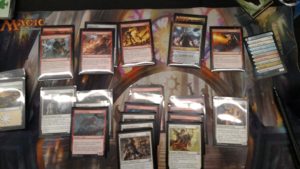
A Solid Rebound
I woke for my first player meeting in at least three years (byes and sleep in specials are amazing), groggy but excited to play and build a grindier deck than I was accustomed to. Fortunately, I opened a very strong pool with a good curve, solid removal, and a pair of planeswalkers (though splashing for Arlinn Kord isn’t as awesome as it seems; it loses a lot of value when it’s not played on curve, unlike Nahiri, the Harbinger, which is generally amazing). I definitely misbuilt it—Extricator of Sin absolutely should have been Wretched Gryff, along with Highland Lake and Port Town to help occasionally emerge it.
All in all, my deck’s power level was high and its interaction was good. As the day wore on, I was happy with my play, didn’t have to mulligan below six very often, lost die rolls all morning long and won them in the afternoon (when they mattered more), and never had to play against an Archangel Avacyn. So, I was generally pretty lucky. I had a hilarious horrible series of draws in round nine, which my teammate Ian can corroborate, but overall I was delighted to end day one at 7-2.
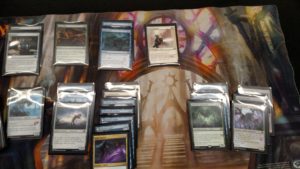
A Beautiful Tricolor Mess
In order to make top eight, I needed to go 6-0 on day two. That’s not an easy feat, particularly since the tournament’s difficulty increases with each win (a fact I constantly reminded myself, in order to not get cocky). My first draft started off strangely, with a weak pack containing a Spell Queller and little else. The card is definitely strong, but I’d much rather be taking a solid monocolor card like Clear Shot.
The draft was hard to read, with no clear color to be in other than blue. Emerge creatures were readily available (and I’d grown to believe that they were both the best reason to be in blue and one of the strongest archetypes). By draft’s end, I had insufficient green or white cards to fill out a deck, but my mana was surprisingly good with an 8-5-4 manabase and two Terrarions. The deck dramatically overperformed, with Desperate Sentry and Grizzled Angler being MVPs. Desperate Sentry may be at its best in tricolor white-blue decks, since it’s really, really good with emerge creatures, but white has none.
I went 3-0 and the deck cemented in my mind three facts I’d starting toying with the night before: blue is much better than it used to be (because of emerge), the format rewards slower decks more than it did in Shadows, and emerge is really, really strong.
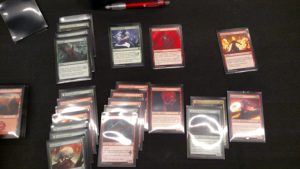
Close, But No Cigar
My second draft deck sadly didn’t get to take advantage of this newfound knowledge; it looked like an amazing Shadows draft deck (though it would have been better served by playing a third Grapple with the Past over the Blood Mist that just needed another combat trick or two. My draft pod had some stiff competition and apparently I faced it all; my opponents were, in order: David Williams, Rich Hoaen, and Alex Majlaton. While I acknowledge them all as bigger names and better players than I, it was only Rich Hoaen who I felt absolutely out of my depth against. I went 2-1, losing to Hoaen in two games.
I ended the tournament at 20th place, my best finish ever. That said, I was one match win away from the top eight, and I can’t wait to go to my next GP and go for gold.
The Next Level
The most exhilarating part of the tournament stemmed not from my successes, but from where I fell short. The best part of going to Montreal was getting to play against substantially better players than I. I caught glimpses of how they think, lines they take, and how they strategize that can help me become a better player. I’ve talked a fair amount about ‘level up moments’ on Hipsters of the Coast (it was my first article here, after all), but it’s been years since I felt as though I was growing at anything other than a steady, incremental rate. After Montreal, I believe that I can see the next level.
In a nutshell, I need to play more deliberately. I’ve been very focused on playing quickly and automating enough cognitive processes that I don’t even have to think very much most of the time; my decisions are often obvious and automatic. This is great for maintaining stamina in a long tournament and for most situations, but it just isn’t good enough when I’m playing someone better than me and they have a plan for my lines of attack and thought. My process also grinds to a screeching halt with too much board complexity; I used to be better at negotiating macro-level strategy, before I focused on automating micro-level decisions. The next level involves reinincorporating high level strategizing and slowing down my play before encountering a bad situation, rather than once I’m in it.
Here’s hoping I can pull that together for GP Louisville.
After Montreal, I had one day at home before flying to Gen Con for an exhausting but fulfilling week of working the booth for Kingdom Death. It was great getting to meet so many fans, teach people how to play a game as cinematically as I could muster, and chat with folks who’ve played things I’ve worked on or made. I even got to hang out and game with the awesome folks from TwitchGameNight, a gang I’d never met in person but now look forward to meeting up with again soon.
So, at the risk of sounding like I’m bragging, I’m pretty happy right now. I’ve enjoyed some tournament success, I’m happy with my career, and I’m pretty delighted with my life overall. I strive to appreciate the good times (and encourage you to do the same), ’cause life’s too short and often sad to not enjoy it when it’s good.
And, as always, thanks for reading.
—Zachary Barash
Zachary Barash is a New York-based game designer. Playing since 1994, he loves Limited and drafts every available format (including several that aren’t entirely meant to be drafted). His favorite contemporary Magic design is Explore, because it’s a Time Walk cast for minimal value.


